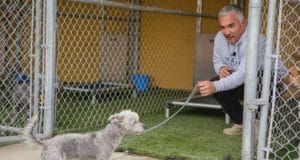Here’s something I’m pretty sure almost everyone learned at one point but doesn’t remember doing: How to walk.
It’s a pretty basic skill that we develop before our brains really start making memories, but as any of us who’s been around toddlers has seen, it doesn’t come without a lot of trial and error. Before you can learn to walk, you have to learn how to fall down.
Developmental specialists say that it should take up to fifteen months for a child to learn to walk on their own. That’s over a year and it seems like a long time, doesn’t it? Keep that in mind, because it’s really not that long a time at all.
Dogs Learning How to Walk
Dogs, of course, learn how to walk much more quickly than humans do, beginning the process at three weeks, but it probably seems to many of you like it takes them forever to learn other things — especially if your dog is having behavioral problems. But, just like you learning to walk, fixing a dog doesn’t happen in a single day, or even a single week. It happens one step at a time.
Every solution begins with identifying the problem first. That is step one. For example, if a dog is showing aggression, you have to figure out the cause before you can find the solution. Is it fearful aggression or protective? Is it directed only at dogs, only at people, or both? Is it being caused by your behavior or something else?
Next, once you’ve identified the problem, you can proceed with the solution. This is identical to a toddler having to learn to stand before they can learn to move forward. And don’t worry if it doesn’t happen overnight. Identifying the problem means paying attention to your dog, getting to know her personality and energy, and putting yourself in her place.
Most of the problems with trying to solve a misbehavior come from impatience. People try to find the instant fix rather than the long-term correction. But what happens if you try to teach an infant to walk by putting him on his feet and letting go?
Exactly — the baby falls down, and you probably wouldn’t expect otherwise. Yet, sometimes, people get frustrated with themselves if they don’t fix their dog’s problem on the first try. Frustration is the beginning of a vicious cycle. When you get frustrated, you begin to subconsciously sabotage yourself because your brain is expecting to fail. That’s called a feedback loop, and when it’s built on something negative, the results can be a disaster.
Soon, you’re sending out that weak and frustrated energy and, instead of making things better with your dog, you actually make the problem worse. Instead of moving forward in your rehabilitation or training, you wind up taking a lot of big steps backwards, and the goal starts to seem farther and farther away.
Use Baby Steps
So when you’re facing what seems like a huge and daunting challenge with fixing your dog’s behavior, take a moment, relax, and understand that any issue can be broken down into the same things you used when you learned to walk: Baby steps. Metaphorically speaking, you may only take one step with your dog today before falling down, but tomorrow you may take two.
And, before you know it, you’re making it all the way across the room on your own without holding onto anything, but you wouldn’t have gotten that far without taking that first halting step on your own. It may take you only fifteen days, or it may take you fifteen months, or more — but you’ll only be able to see your progress if you remember how tiny that first step seemed, and how much farther you’ve gone beyond that, day by day.
Getting from that first step to success may seem like a daunting journey, but the only way it will ever happen is to start the process. And the only way to start the process is the same way you start any intimidating task. As the old Chinese proverb says:
“Every journey of a thousand miles begins with a single step.”
Stay calm, and step forward!
[Although he didn’t mention it, we wanted to point out that today is Cesar’s birthday — and Junior’s! Send them your greetings in the comments below. — Eds.]











